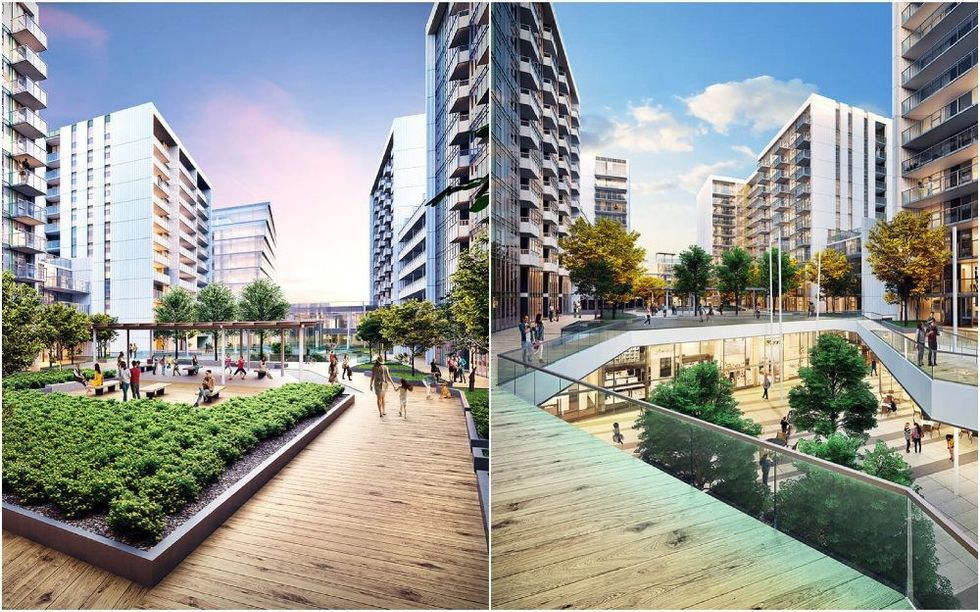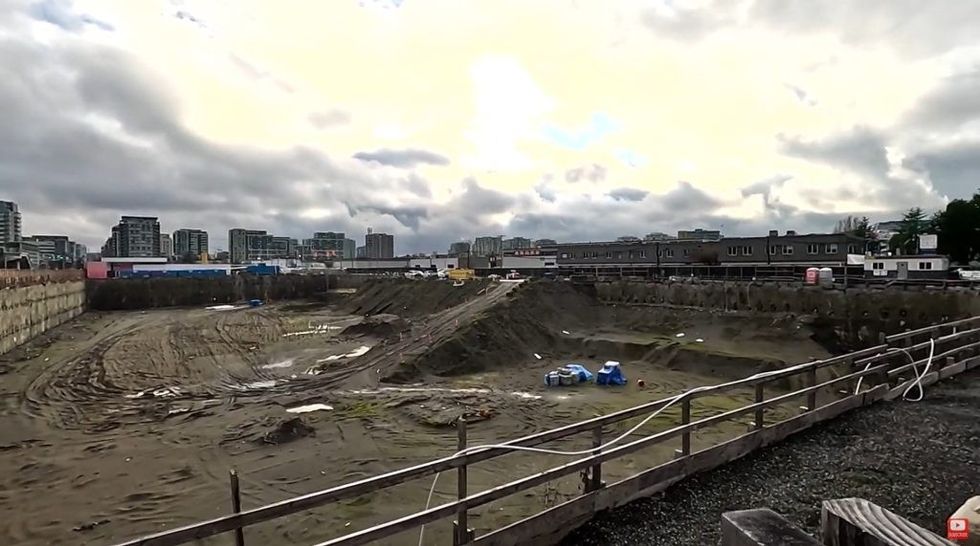The Atmosphere project in Richmond, British Columbia that has been a hole in the ground for several years and was placed under creditor protection in 2022 is now proceeding, once again, towards applying for a building permit, but it remains to be seen when, if ever, the project will reach the construction stage.
The Atmosphere project was set to be a collection of five condominium towers, one rental tower, and one office tower located at 7960 Alderbridge Way, 5333 No. 3 Road, and 5411 No. 3 Road in Richmond, across the street from the Lansdowne Centre shopping mall and the Canada Line SkyTrain's Lansdowne Station.
According to court documents obtained by STOREYS, the site is owned by 0989705 BC Ltd., Alderbridge Way Limited Partnership, and Alderbridge Way GP Ltd., with 0989705 BC Ltd. as the beneficial owner and holder of the legal land title. None of the companies directly employ any staff in British Columbia, with all individuals working on the project employed through contracts.
The shareholders on the project are Gatland Development Corporation, REV Investments Inc., and South Street Development Managers Ltd., with the list of limited partners also including JV Driver Projects Inc., G. Wong Holdings Inc., MNB Enterprises Inc., Chatanooga Investments Ltd., Kenneth Voth, and R. Jay Management Ltd.
The troubles on the Richmond Atmosphere project began -- as with many of the troubles that have dogged the development industry -- in March 2020 with the COVID-19 pandemic. At the time, the developers' senior secured construction lender -- Toronto-based private lender Romspen Investment Corporation -- "suspended all further draws and advances" under the construction facility.
The developers then spent the next year seeking out alternative construction financing and equity infusions in order to carry on with the project, but were unable to secure what they needed. In February 2021, Romspen issued demand from the developers for $158M that was owed.
The developers ultimately decided on pursuing a sale and investment solicitation process (SISP) in 2021, a process where a commercial real estate broker is hired to market and seek out interested parties to either invest in the project or buy it outright. The brokerage hired was Cushman & Wakefield, and although a bid was selected, the sale ultimately did not close.
The outstanding debt was reportedly a roadblock for interested parties, so the developers filed a petition in the Supreme Court of British Columbia seeking creditor protection under the Companies' Creditors Arrangement Act (CCAA) in April 2022 in order to gain breathing room to restructure its finances in a way that would become more appealing to potential buyers or investors.
"The Petitioners believe, if provided the chance to restructure in a stronger financial and post-pandemic market, supported by increasing market, land value, and work in progress, a successful outcome can be reached for the benefit of all the Petitioners' stakeholders," reads the petition. "As such, it is in the best interests of the Petitioners' stakeholders to apply for relief under the CCAA."
According to the petition, which refers to the developers' situation as a "liquidity crisis," the total amount owed was about $252M, not including over $95M in interest and other liabilities, such as property taxes.
A court order approving a second sales and investment solicitation process was granted on April 25, 2022, and the creditor protection was extended several times, but this second SISP was again terminated, on December 7, for a similar reason: the building permit for the project had expired and the developers and Romspen expected it to result in potential offers coming in at "significantly lower" prices.
READ: Inside the Port Capital CCAA Proceedings, BC's Other Developer Insolvency Case
How Development Potential Affects Transactions

When it comes to commercial real estate transactions, a variety of factors can change the appeal of a given property, whether it be an existing building or a vacant parcel of land, and almost all of those factors can really be boiled down to the how they affect the development potential of the site.
As is the case with prospective homebuyers, the location matters. A plot of land in Abbotsford may not be as appealing as a plot of land in Langley, which may not be as appealing as a plot of land in the Metrotown neighbourhood of Burnaby.
Just as important, if not more, is how the site is zoned. A plot of land in Abbotsford may not carry as much appeal as a plot of land in Burnaby, but if the site in Abbotsford is zoned for industrial uses while the site in Burnaby is zoned for single-detached homes, the appeal changes.
These two major factors, along with others, can be captured by whether the site in question has a development permit and/or building permit in place.
"As a general rule of thumb, a property that has been through the rezoning, development permit and/or building permit approvals process should be able to command a premium price compared to a development site that has yet to commence the entitlement process," says Ian Brackett, Senior Broker at Vancouver-based Goodman Commercial.
Brackett explains that for the new group that takes over, most of the fees and charges associated with permits could potentially already be paid if permits are already in place, saving the new owner much of the costs associated with designing the building, such as consultant fees for architects and engineers. Uncertainty around policies and CACs is also greatly reduced.
Time directly translates into money in real estate, and having a property with rezoning already approved and a green light for construction can often shave at least two years of the project delivery timeline, adds Brackett. If a buyer acquires a development site without approvals and permits in place, they would likely have to spend significant time working towards getting those approvals and permits, on top of paying the costs of holding the property, such as property taxes and interest costs.
Brackett notes that there are some cases where having permits in place does not have a "material impact on the price," such as in cases where the new buyer wants to start over, perhaps to put their own imprint on the project rather than continuing with somebody else's design. There is also the risk of taking over the development of a project during a tough economic period, which is perhaps why the owners of the Richmond Atmosphere project were unable to secure a buyer the previous two times.
Richmond Atmosphere
In February, the Supreme Court granted the owners an extension on the creditor protection to June 2, as well as another $1.2M in debtor-in-possession (DIP) financing -- financing that allows insolvent companies to continue the restructuring process -- to be advanced to the owners by Romspen.
Also approved was a $250K fee to Vancouver-based GBL Architects, who served as the architect of the Richmond Atmosphere project. Prior to the owners seeking creditor protection, GBL Architects filed a civil claim against the owners for just shy of $540K, but the Monitor -- the court-appointed third-party that oversees and retains authority over the insolvent company through CCAA proceedings -- reached an agreement with GBL in February 2023 to stay on the project, for reasons that come back to the building permit and development potential of the site.

According to case documents, the original building permit was issued under the 2012 Building Code and the project specifications need to be updated to comply with the 2018 Building Code.
"If another architect were to be engaged, the time delays and costs would be greater than proceeding with GBL," the Monitor, Vancouver-based Bowra Group, said in a report to the Court. If another architect was engaged, the designs of the project would have to be approved by the City of Richmond once more, and there could potentially be issues related to copyright.
Complicating the matters further is that there is now a looming November deadline.
The 2023 Building Code is set to be adopted in December, and the Monitor notes that it is "imperative" that the owners submit a new building permit application before that happens. If an application is not submitted before then, the Monitor adds, the owners would have to return to the development permit stage, which could result in a delay of up to four years, increased financial contributions to the City, and a loss of density, all of which would further harm the value of the property to potential buyers.
GBL Architects has indicated that it expects to meet the deadline and the Monitor estimates that the new building permit application will cost $1.9M, which does not include the fees paid to the City after the submission, before the building permit is issued.
Romspen Investment Corporation
Another complication is Romspen itself.
After Romspen suspended all further draws and advances under the construction financing agreement in March 2020, they were sued by CIBT Education Group, the parent company of Global Education City (GEC), a Vancouver-based developer that specializes in off-campus student housing. GEC had agreed to buy two of Atmosphere's six residential towers as well as some retail space in the office building, the purchase of which was affected by Romspen pulling the construction funding.
GEC filed a civil lawsuit against Romspen in October 2022 for breach of contract, saying -- according to the notice of civil claim provided to STOREYS -- that Romspen had no legal right to do so. At the time, Romspen cited the economic conditions as a result of the COVID-19 pandemic. However, GEC claims that Romspen chose to continue funding several other of its ongoing projects at the time, including the Landmark project in White Rock, the Talara Apartments project in Toronto, and more.
GEC also notes that Romspen's revenue in 2020 ultimately reached $240M, an increase from 2019, which further improved in 2021.
Romspen's annual Mortgage Investment Fund report for 2020 lists all of the projects GEC mentions, including how it was approached to refinance "a quick flip" of the Talara Apartments in "late March of 2020," but makes no mention of the Richmond Atmosphere project anywhere else in the 56-page report.
Reached for comment, CIBT Chairman and CEO Toby Chu told STOREYS that he could not speak to the case because it is ongoing, but says that the discovery date has been set for August 2023 and trial date for January 2024.
READ: Inside The Impending Sale Of Etobicoke's Woodbine Mall
Romspen also recently initiated receivership proceedings against its largest borrower, the owner of Woodbine Mall and several other properties in Ontario. In that case, the owner of Woodbine Mall, Chris Hinn, said in an affidavit that he believes Romspen "started to target my companies and assets very aggressively in order to deal with its mounting financial troubles," alluding to reports that Romspen had restricted redemptions from its flagship real estate fund, the aforementioned Mortgage Investment Fund, in late-2022.
Both the GEC civil lawsuit and Woodbine Mall receivership proceedings remain ongoing, and it's unclear how they will be resolved, and whether resolutions of any kind would have a material effect on the CCAA proceedings for the Richmond Atmosphere project, but the clocks are now ticking.





















